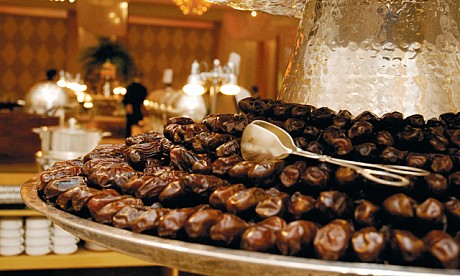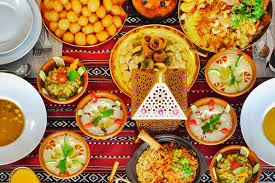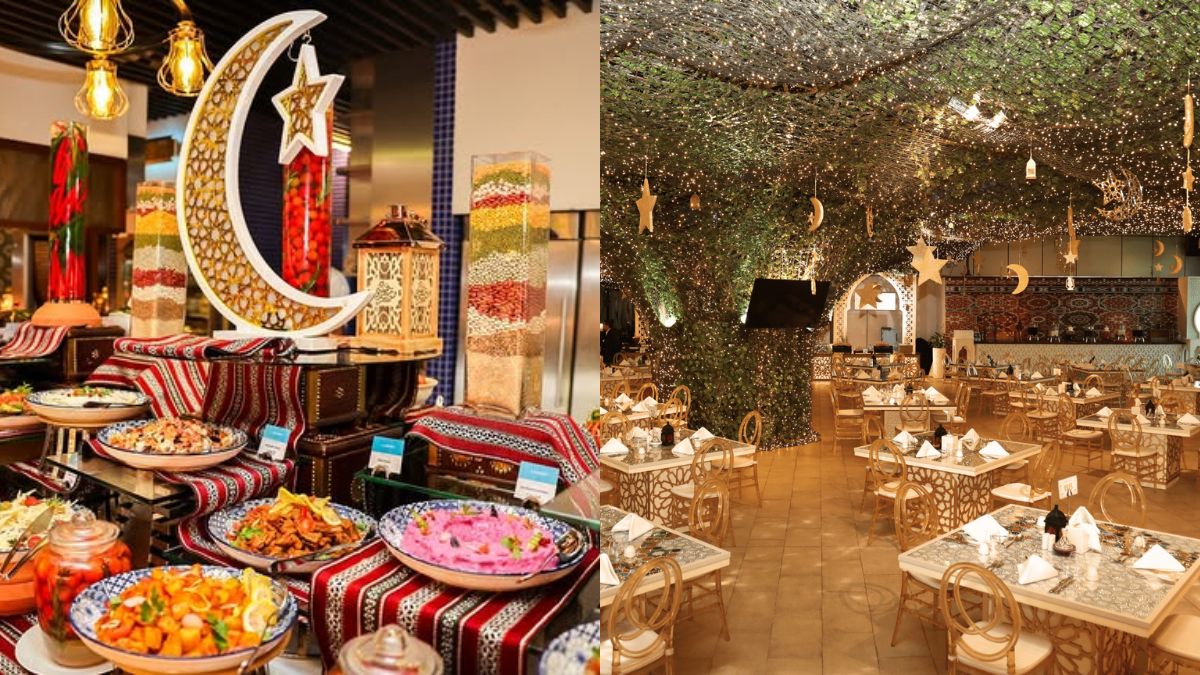The Spiritual Essence of Ramadan in Bahrain
Ramadan in Bahrain is not only a sacred time of fasting and prayer but also a celebration of family, unity, and traditions. For Bahrainis, the holy month represents a time to deepen their connection with faith while strengthening community bonds. Each day begins before sunrise with suhoor, a light meal that provides strength for the long hours of fasting. At sunset, the adhan marks the time for iftar, when families and communities come together to break their fast with dates and water, followed by an array of traditional dishes. These meals are more than food; they are symbols of identity, heritage, and love passed down through generations.
Dates and Water: The Symbolic Beginning
The first bite after a day of fasting is always humble yet deeply meaningful. Bahrainis begin their iftar with dates, often fresh or stuffed with nuts, and a sip of water or laban, a yogurt-based drink. This practice connects them with the Prophet’s tradition and provides an instant boost of energy. In Bahraini households, the simple sweetness of dates is often paired with Arabic coffee, or qahwa, flavored with cardamom, setting the tone for the evening meal.
Traditional Soups That Warm the Soul
After breaking the fast, Bahrainis often turn to soups that are light yet nourishing. Lentil soup is a staple, prepared with red or yellow lentils, onions, and spices that soothe the stomach after a day of fasting. Chicken and vermicelli soup is another beloved choice, often cooked slowly to extract deep flavors. These soups are not just about nutrition; they bring comfort, warmth, and a sense of belonging to the dining table.

Samboosa: The Crispy Ramadan Favorite
No Bahraini Ramadan table is complete without samboosa. These golden, triangular pastries are filled with various stuffings, from spiced minced meat to cheese or vegetables. The crispy exterior and savory filling make them a crowd favorite, often prepared in large batches so every guest can enjoy them. Families experiment with fillings, adding modern twists while preserving the traditional recipes. For many, the sizzling sound of samboosa frying in the kitchen is a signal that iftar is near.
Thareed: The Hearty Ramadan Stew
Thareed holds a special place in Bahraini Ramadan traditions. Known as the “Ramadan dish of the Prophet,” thareed is a slow-cooked stew of meat, vegetables, and spices, served over thin pieces of bread that soak up the flavorful broth. This dish represents generosity and nourishment, often served in large platters for families and guests to share. Its rich flavors and hearty texture make it the centerpiece of many Bahraini iftar meals.
Machboos: A National Treasure on the Table
Among the most iconic Bahraini dishes is machboos, a spiced rice dish cooked with chicken, lamb, or fish. Infused with saffron, dried limes, and a blend of Bahraini spices, machboos is both aromatic and flavorful. During Ramadan, families often reserve machboos for special gatherings, as it reflects both cultural pride and culinary mastery. Its colorful presentation and enticing aroma turn any iftar meal into a festive occasion.
Sweet Delights That Mark the End of the Meal
Ramadan in Bahrain would not feel complete without traditional sweets. Luqaimat, golden dumplings drizzled with date syrup or honey, are perhaps the most popular. Crisp on the outside and soft inside, they symbolize joy and celebration. Another sweet treat is balaleet, a dish of sweet vermicelli served with a savory omelet on top. The contrast of flavors makes it unique to the Gulf. Desserts like harees, made of wheat and meat slow-cooked to a creamy consistency, are also cherished during the holy month. These sweets not only satisfy cravings but also bring a festive touch to the evening gatherings.
Refreshing Drinks to Beat the Heat
As Ramadan often falls during the warmer months, refreshing beverages are essential in Bahraini iftars. Vimto, a sweet berry-flavored drink, has become a Ramadan staple across the Gulf, and Bahrain is no exception. Tamarind juice, rose water drinks, and laban also play a key role in quenching thirst after long hours of fasting. These drinks are prepared in large jugs and served generously to guests, adding color and refreshment to the table.
Suhoor: A Meal of Energy and Balance
While iftar is often lavish, suhoor is simpler and focused on providing energy for the day ahead. Bahraini families prepare meals that are filling yet light, such as breads, cheese, dates, eggs, and fresh fruits. Some also enjoy harees or savory porridge at suhoor for its slow-releasing energy. The emphasis during suhoor is balance eating enough to sustain the fast without overwhelming the body.
Ramadan Gatherings and Community Spirit
In Bahrain, Ramadan is as much about community as it is about individual spirituality. Families open their homes to relatives, neighbors, and friends, often inviting them to share in the iftar meal. Mosques and charitable organizations also prepare meals for those in need, ensuring that no one is left hungry. The sharing of food, especially traditional dishes, reinforces the values of compassion, generosity, and unity. For many Bahrainis, the act of cooking and serving during Ramadan is a form of worship in itself.
Preserving Culinary Heritage Through Generations
Bahraini Ramadan dishes are not just recipes; they are part of the nation’s cultural identity. Grandmothers and mothers take pride in teaching younger generations the art of preparing thareed, machboos, or luqaimat. Many families keep handwritten recipes that have been passed down for decades. While modern influences have brought new flavors to the table, the essence of Bahraini Ramadan food remains deeply rooted in tradition. This preservation of culinary heritage ensures that every Ramadan feels both familiar and meaningful.
Modern Twists on Classic Ramadan Dishes
Although traditional recipes dominate Bahraini Ramadan tables, modern adaptations have also found a place. Some families experiment with healthier versions of fried foods, using air fryers or baking instead of deep-frying. Others incorporate international flavors into samboosa fillings or desserts. Restaurants and cafes in Bahrain also introduce innovative Ramadan menus that blend global cuisines with Bahraini favorites. These modern twists not only appeal to younger generations but also show the versatility of Bahraini cuisine.
Ramadan Markets and Festive Atmosphere
Bahrain’s streets and neighborhoods come alive during Ramadan evenings. Local markets, known as souqs, are filled with vendors selling ingredients, sweets, and Ramadan specialties. The festive atmosphere is heightened by lanterns, decorations, and the chatter of families shopping together. Food stalls offer freshly fried samboosa, grilled kebabs, and sweet treats, making the markets a vibrant part of the Ramadan experience. These gatherings create lasting memories for families and highlight the strong social aspect of Ramadan.
The Role of Hospitality in Ramadan
Hospitality is central to Bahraini culture, and during Ramadan, it becomes even more significant. Guests are always welcomed warmly, and no one leaves without tasting the dishes on the table. Large platters are prepared not just for family but also for neighbors and friends. Even in workplaces, employees often share iftar together, bringing homemade dishes to create a communal spread. The generosity displayed through food reflects the spirit of Ramadan and reinforces bonds within society.
Children’s Joy in Ramadan Traditions
For children in Bahrain, Ramadan is a time of excitement and learning. They eagerly look forward to girgian, a traditional Gulf celebration where children dress in colorful clothes, sing songs, and receive sweets and nuts from neighbors. The unique dishes of Ramadan also become part of their cherished memories, as they associate the holy month with the flavors of samboosa, luqaimat, and sweet drinks. Parents encourage children to take part in preparing meals, passing down culinary traditions in fun and engaging ways.

Eid Al-Fitr: The Culmination of Ramadan Feasts
The holy month ends with the joyous celebration of Eid al-Fitr, a festival that also revolves around food and family. Bahraini households prepare grand feasts, featuring dishes like machboos, grilled meats, and an assortment of sweets. Guests visit one another’s homes, exchanging greetings and sharing meals. Eid desserts such as ma’amoul, stuffed with dates or nuts, are baked in large quantities to welcome visitors. The transition from fasting to feasting represents gratitude, renewal, and the joy of togetherness.
The Deeper Meaning Behind Ramadan Foods
Beyond the flavors and aromas, Bahraini Ramadan dishes carry deep symbolic meaning. They represent patience, gratitude, and the act of giving. Sharing food becomes a spiritual act, reminding people of the blessings they enjoy and the responsibility to care for others. Each bite of thareed or sip of laban is not just nourishment for the body but also a reminder of faith and tradition. In Bahrain, Ramadan food is an extension of devotion, family ties, and cultural pride.
How Bahrainis Keep the Spirit Alive
Even as lifestyles evolve, Bahrainis hold firmly to their Ramadan food traditions. Families adapt to busy schedules by preparing dishes ahead of time, yet they still make room for the essential recipes that define the holy month. Social media has also become a platform for sharing recipes, food photography, and Ramadan experiences, allowing traditions to reach a wider audience. Despite modern changes, the heart of Bahraini Ramadan celebrations remains rooted in faith, family, and food.
Conclusion: A Taste of Faith and Togetherness
Ramadan in Bahrain is a season where spirituality, family, and cuisine intertwine in the most beautiful way. The unique dishes, from samboosa to machboos, thareed to luqaimat, are more than meals they are experiences that unite generations, strengthen communities, and celebrate cultural identity. Every dish tells a story of resilience, love, and devotion, making the holy month an unforgettable time of year. For Bahrainis, food during Ramadan is not simply about breaking a fast; it is about honoring traditions, sharing blessings, and embracing the deeper meaning of togetherness.
Do follow Gulf Magazine on Instagram.
Also Read – Flavors Across Oceans: Indian Ocean Trade Shaped Bahraini Cuisine



